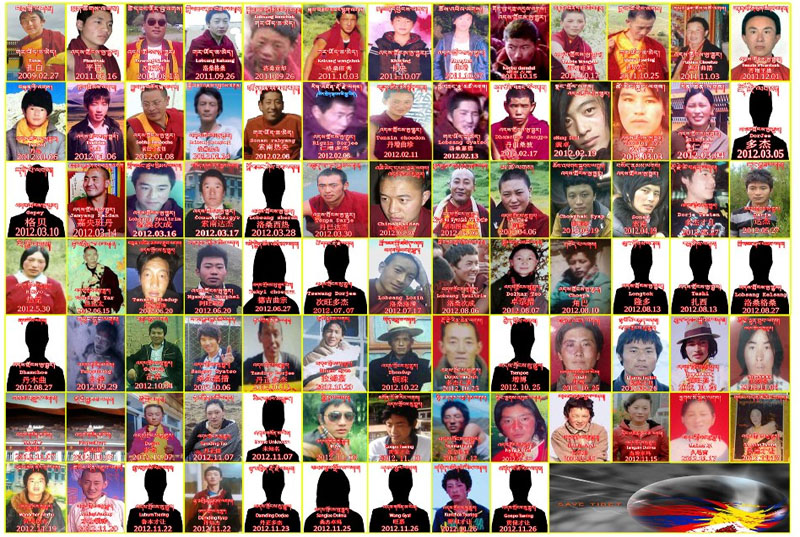
BEIJING — A Tibetan Buddhist monk has set himself on fire in western China in what appeared to be the latest such radical protest against Beijing's rule, a U.S. government-backed radio station and rights monitoring group said.
The unidentified monk set himself alight on a road outside the town of Machu in a traditionally Tibetan area of Gansu province at around 7 p.m. Thursday, Radio Free Asia and London-based Free Tibet reported.
Police who arrived shortly afterward took the monk away and there was no immediate word on his condition, they said.
A man who answered the phone at a regional police station hung up immediately after the caller asked for information.
Calls to other government offices rang unanswered.
While information from the isolated area is incomplete, the incident is believed to bring to at least 146 the number of Tibetans who have self-immolated in recent years, about 125 of whom have died, according to monitoring groups.
Eyewitnesses have been quoted as saying that many of those who self-immolated cried out for Tibetan independence or prayed for the return of the Dalai Lama.
While information from the isolated area is incomplete, the incident is believed to bring to at least 146 the number of Tibetans who have self-immolated in recent years, about 125 of whom have died, according to monitoring groups.
Eyewitnesses have been quoted as saying that many of those who self-immolated cried out for Tibetan independence or prayed for the return of the Dalai Lama.
Tibet's Buddhist leader fled Tibet in 1959 amid an abortive uprising against Chinese forces who had occupied the Himalayan region a decade earlier.
While China claims Tibet has been part of its territory for more than seven centuries, many Tibetans say they were essentially independent for most of that time.
Thursday's self-immolation was the first known to have occurred since either March or May, perhaps reflecting stepped-up security measures in Tibetan areas of western China where most such incidents have occurred.
The protests are seen as an extreme expression of the anger and frustration felt by many Tibetans — both lay people and members of the Buddhist clergy — living under heavy-handed Chinese rule.
In a new book on the self-immolations, Tibetan writer and rights activist Tsering Woeser describes them as forming a "broad protest movement that continues to this day."
"Because no other method is available for Tibetans to voice their protests, and because only the horror of self-immolation is able to capture the attention of the world, it has become the choice of the bravest protesters in Tibet," Woeser writes in "Tibet on Fire: Self-Immolations Against Chinese Rule."
Tibetan monks and nuns are among the most active opponents of Chinese rule in the region and the strongest proponents of Tibet's independent identity, prompting the authorities to subject them to some of the harshest and most intrusive restrictions.
Those include the stationing of police and informers inside monasteries and a 2007 regulation stating that reincarnations of high-ranking lamas — a central feature of Tibet's unique tantric strain of Buddhism — must be subject to Communist Party approval.
Beijing blames the Dalai Lama and others for inciting the immolations.
While China claims Tibet has been part of its territory for more than seven centuries, many Tibetans say they were essentially independent for most of that time.
Thursday's self-immolation was the first known to have occurred since either March or May, perhaps reflecting stepped-up security measures in Tibetan areas of western China where most such incidents have occurred.
The protests are seen as an extreme expression of the anger and frustration felt by many Tibetans — both lay people and members of the Buddhist clergy — living under heavy-handed Chinese rule.
In a new book on the self-immolations, Tibetan writer and rights activist Tsering Woeser describes them as forming a "broad protest movement that continues to this day."
"Because no other method is available for Tibetans to voice their protests, and because only the horror of self-immolation is able to capture the attention of the world, it has become the choice of the bravest protesters in Tibet," Woeser writes in "Tibet on Fire: Self-Immolations Against Chinese Rule."
Tibetan monks and nuns are among the most active opponents of Chinese rule in the region and the strongest proponents of Tibet's independent identity, prompting the authorities to subject them to some of the harshest and most intrusive restrictions.
Those include the stationing of police and informers inside monasteries and a 2007 regulation stating that reincarnations of high-ranking lamas — a central feature of Tibet's unique tantric strain of Buddhism — must be subject to Communist Party approval.
Beijing blames the Dalai Lama and others for inciting the immolations.
The Dalai Lama says he opposes all violence but has neither publicly condemned nor encouraged the self-immolations.
Aucun commentaire:
Enregistrer un commentaire